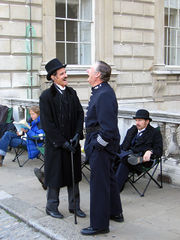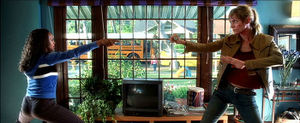 Actors in period costume sharing a joke whilst waiting
between takes during location filming.
Actors in period costume sharing a joke whilst waiting
between takes during location filming.An actor is a person who acts, or plays a role, in an artistic production. The term commonly refers to someone working in movies, television, live theatre, or radio, and can occasionally denote a street entertainer. Besides playing dramatic roles, actors may also sing or dance or work only on radio or as a voice artist. A female actor may be known as an actress, although the term "actor" is now used as a gender-neutral term.
An actor usually plays a fictional character. In the case of a true story (or a fictional story that portrays real people) an actor may play a real person (or a fictional version of the same). Occasionally, actors appear as themselves. One notable example of this is John Malkovich's performance in Being John Malkovich.
Contents |
Etymology
"Actor" is directly from the masculine Latin noun actor (feminine, actrix) from the verb agere "to do, to drive, to pass time" + the suffix -or "so./st. who performs the action indicated by the stem". Alternatively from Greek ἂκτωρ (aktor), leader, from the verb ἂγω (agō), to lead or carry, to convey, to bring. [1]
History
The first recorded case of an actor performing took place in 534 BC (probably on 23 November, though the changes in calendar over the years make it hard to determine exactly) when the Greek performer Thespis stepped on to the stage at the Theatre Dionysus and became the first person to speak words as a character in a play. The machinations of storytelling were immediately revolutionized. Prior to Thespis' act, stories were told in song and dance and in third person narrative, but no one had assumed the role of a character in a story. In honour of Thespis, actors are commonly called Thespians. Theatrical myth to this day maintains that Thespis exists as a mischievous spirit, and disasters in the theatre are sometimes blamed on his ghostly intervention.
Actors were traditionally not people of high status, and in the Early Middle Ages travelling acting troupes were often viewed with distrust. However, this negative perception dramaticaly changed in 20th Century as acting became an honored and popular profession and art. Part of the reason is due to the rise of the popular appeal and access to dramatic film entertainment and the resulting rise of the movie star in social status and the large salaries they commanded. The combination of public presence and wealth had a profound rehabilitation to the image.
In the past, only men could become actors. In the ancient and medieval world, it was considered disgraceful for a woman to go on the stage, and this belief continued right up until the 17th century, when in Venice it was broken. In the time of William Shakespeare, women's roles were played by men or boys, though there is some evidence to suggest that women disguised as men also (illegally) performed.
Techniques of acting
 Actresses (Uma Thurman and Vivica A. Fox) performing
stage combat
Actresses (Uma Thurman and Vivica A. Fox) performing
stage combat
Actors employ a variety of techniques that are learned through training and experience. Some of these are:
- The rigorous use of the voice to communicate a character's lines and express emotion. This is achieved through attention to diction and projection through correct breathing and articulation. It is also achieved through the tone and emphasis that an actor puts on words
- Physicalisation of a role in order to create a believable character for the audience and to use the acting space appropriately and correctly
- Use of gesture to complement the voice, interact with other actors and to bring emphasis to the words in a play, as well as having symbolic meaning
Shakespeare is believed to have been commenting on the acting style and techniques of his era when Hamlet gives his famous advice to the players:
Speak the speech, I pray you, as I pronounced it to you, trippingly on the tongue: but if you mouth it, as many of your players do, I had as lief the town-crier spoke my lines. Nor do not saw the air too much with your hand, thus, but use all gently; for in the very torrent, tempest, and, as I may say, the whirlwind of passion, you must acquire and beget a temperance that may give it smoothness. O, it offends me to the soul to hear a robustious periwig-pated fellow tear a passion to tatters, to very rags, to split the ears of the groundlings, who for the most part are capable of nothing but inexplicable dumbshows and noise: I would have such a fellow whipped for o'erdoing Termagant; it out-herods Herod: pray you, avoid it.
Be not too tame neither, but let your own discretion be your tutor: suit the action to the word, the word to the action; with this special observance: o'erstep not the modesty of nature: for any thing so overdone is from the purpose of playing, whose end, both at the first and now, was and is, to hold, as 'twere, the mirror up to nature; to show virtue her own feature, scorn her own image, and the very age and body of the time his form and pressure. Now this overdone, or come tardy off, though it make the unskilful laugh, cannot but make the judicious grieve; the censure of the which one must in your allowance o'erweigh a whole theatre of others. O, there be players that I have seen play, and heard others praise, and that highly, not to speak it profanely, that, neither having the accent of Christians nor the gait of Christian, pagan, nor man, have so strutted and bellowed that I have thought some of nature's journeymen had made men and not made them well, they imitated humanity so abominably.
O, reform it altogether. And let those that play your clowns speak no more than is set down for them; for there be of them that will themselves laugh, to set on some quantity of barren spectators to laugh too; though, in the mean time, some necessary question of the play be then to be considered: that's villanous, and shows a most pitiful ambition in the fool that uses it. Go, make you ready.
Actors playing the opposite sex
Women sometimes play the roles of prepubescent boys, because in some regards a woman has a closer resemblance to a boy than does a man. The role of Peter Pan, for example, is traditionally played by a woman. The tradition of the principal boy in pantomime may be compared. An adult playing a child occurs more in theater than in film. The exception to this is voice actors in animated films, where boys are generally voiced by women, as heard in The Simpsons. Opera has several 'pants roles' traditionally sung by women, usually mezzo-sopranos. Examples are Hansel in Hänsel und Gretel, and Cherubino in The Marriage of Figaro.
Mary Pickford played the part of Little Lord Fauntleroy in the first film version of the book. Linda Hunt won an Academy Award for Best Supporting Actress in The Year of Living Dangerously, in which she played the part of a man.
Having an actor play the opposite sex for comic effect is also a long standing tradition in comic theatre and film. Most of Shakespeare's comedies include instances of cross dressing, and both Dustin Hoffman and Robin Williams appeared in hit comedy films where they were required to play most scenes dressed as women. Tony Curtis and Jack Lemmon famously posed as women to escape gangsters in the Billy Wilder film Some Like It Hot. Several roles in modern plays and musicals are played by a member of the opposite sex, such as the character "Edna Turnblad" (originally played by Harvey Fierstein) in the Broadway musical Hairspray.
Acting awards
Academy Awards, also known as the Oscars, for film
Golden Globe Awards for film and television
Emmy Awards for television
Genie Awards for Canadian film
Gemini Awards for Canadian television
British Academy of Film and Television Arts Award for film and television
Tony Awards for the theatre (specifically, Broadway theatre)
European Theatre Awards for the theatre
Laurence Olivier Awards for the theatre
Screen Actors Guild Awards for actors in film and television
César Awards for French film
See also
Suggested reading
An Actor Prepares by Konstantin Stanislavski (Theatre Arts Books, ISBN 0878309837, 1989)
A Dream of Passion: The Development of the Method by Lee Strasberg (Plume Books, ISBN 0452261988, 1990)
Sanford Meisner on Acting by Sanford Meisner (Vintage, ISBN 0394750594, 1987)
Letters to a Young Actor by Robert Brustein (Basic Books, ISBN 0465008062, 2005).
The Alexander Technique Manual by Richard Brennan (Connections Book Publishing ISBN 1-85906-163-X 2004)
The Empty Space by Peter Brook




 216.73.216.133
216.73.216.133 User Stats:
User Stats:
 Today: 0
Today: 0 Yesterday: 0
Yesterday: 0 This Month: 0
This Month: 0 This Year: 0
This Year: 0 Total Users: 117
Total Users: 117 New Members:
New Members:
 216.73.xxx.xxx
216.73.xxx.xxx
 Server Time:
Server Time: